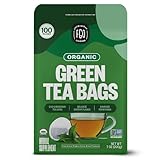Green Tea: Nutrition Facts, Benefits, Side Effects, Uses
Green tea is more than a beverage, it’s a lifestyle rooted in centuries of tradition and increasingly validated by modern science.
Known for its delicate flavor, energizing yet calming properties, and potent health-promoting compounds, green tea offers much more than caffeine.
From its powerful antioxidant profile to its metabolism-boosting and skin-clearing abilities, green tea remains one of the most revered drinks worldwide for good reason.
Whether you’re a daily tea drinker or curious about adding green tea to your routine, this guide breaks down everything you need to know about green tea, from nutrition facts and brewing tips to potential side effects and emerging health research.
What is Green Tea?
Green tea comes from the Camellia sinensis plant, the same plant used to make black and oolong teas.
However, green tea differs in one major way—it’s minimally oxidized.
The leaves are steamed or pan-fired shortly after harvest to preserve their natural green color and delicate flavors, along with their high concentrations of antioxidants like EGCG (epigallocatechin-3-gallate).
This minimal processing helps retain its polyphenols, giving green tea its impressive health benefits, including anti-inflammatory, metabolic, and cardiovascular support (Chow & Hakim, 2011; Sharpe et al., 2016).
Nutrition Facts of Green Tea
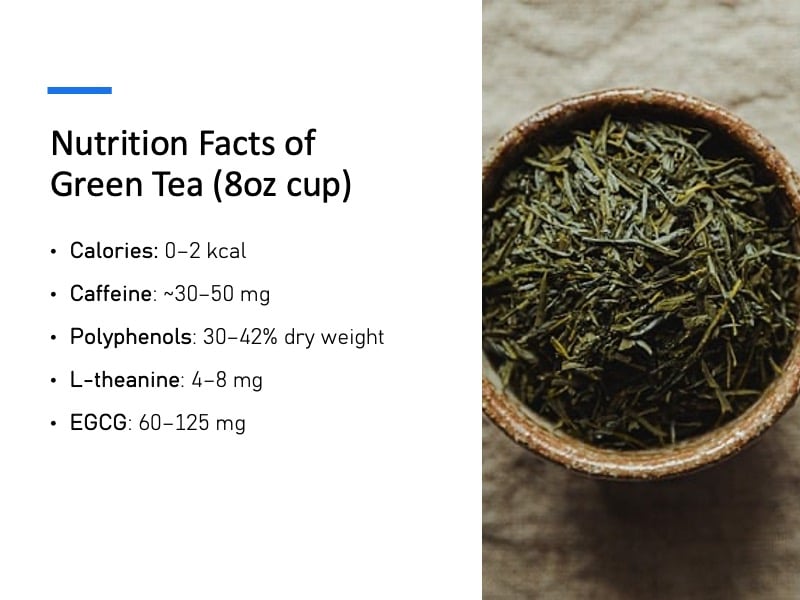
Green tea is virtually calorie-free but packs a powerful punch in micronutrients and bioactive compounds.
A standard 8 oz. cup of brewed green tea contains:
- Calories: 0–2 kcal
- Caffeine: ~30–50 mg
- Polyphenols: 30–42% dry weight
- L-theanine: 4–8 mg
- EGCG: 60–125 mg
These compounds work synergistically to fight oxidative stress, support brain function, and reduce inflammation.
Green Tea vs. Matcha Tea: Key Differences
Matcha tea and green tea both originate from the same plant, but their production and consumption differ in ways that impact their nutrient profile and taste.
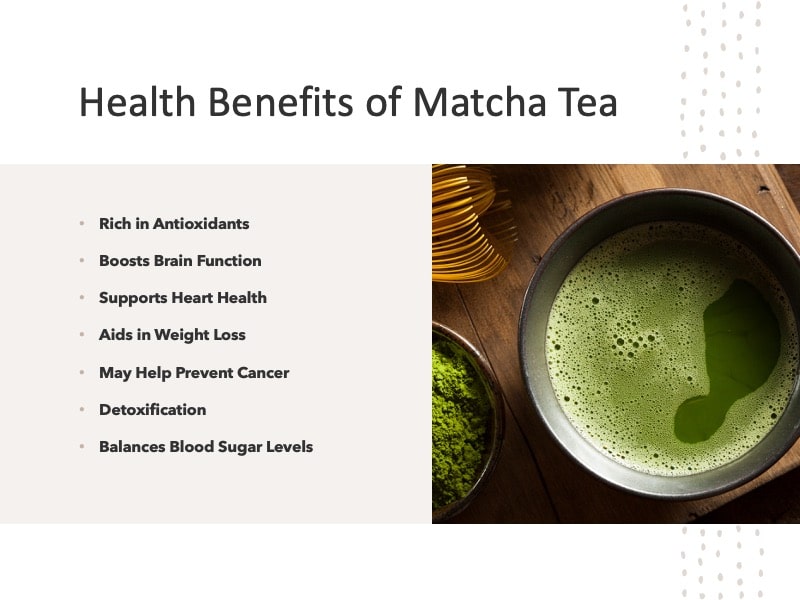
Processing & Preparation
- Green Tea: Steamed or pan-fired, then steeped in hot water. The leaves are discarded after brewing.
- Matcha: Shade-grown, de-stemmed, and stone-ground into powder. The entire leaf is consumed.
Nutritional Content
- Green Tea: High in antioxidants, but lower concentrations than matcha due to water extraction.
- Matcha: Offers a more potent dose of catechins, L-theanine, and chlorophyll because you’re consuming the whole leaf.
Caffeine & Flavor
- Green Tea: 25–50 mg caffeine per cup; flavor is light, grassy, slightly astringent.
- Matcha: 60–70 mg caffeine per serving; flavor is rich, umami, and naturally sweeter.
Brewed Green Tea vs. Green Tea Extract Supplements
| Aspect | Brewed Green Tea | Green Tea Supplements |
|---|---|---|
| EGCG content | Moderate (~60–125 mg/cup) | High (~200–500 mg/capsule) |
| Bioavailability | Better with brewed tea | May vary by formulation |
| Side effects risk | Low | Higher (nausea, liver stress in some) |
| Experience factor | Relaxing and mindful | Quick and convenient |
Green tea extract supplements offer convenience and potency, but brewing green tea delivers unique stress-relieving and absorption benefits.
For most people, a combination or rotating approach works best (Chow et al., 2003; Zaveri, 2006).
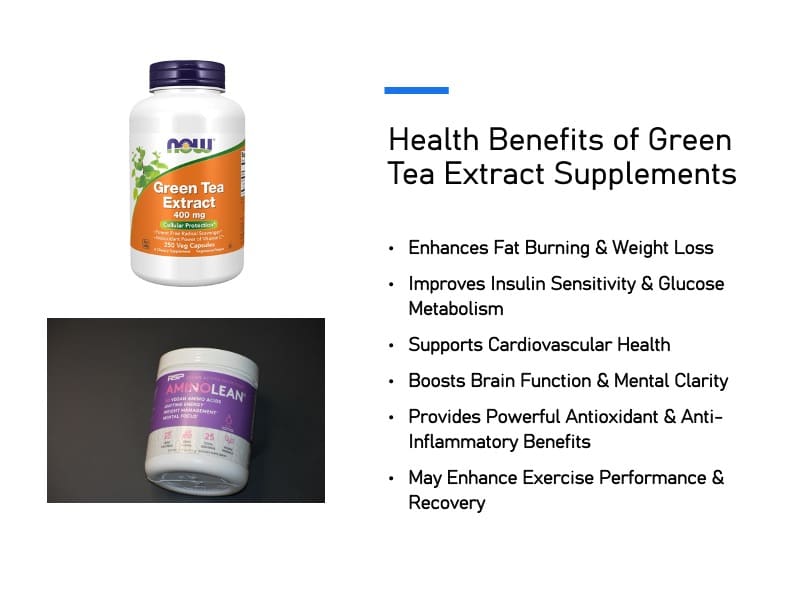
Top 10 Health Benefits of Green Tea
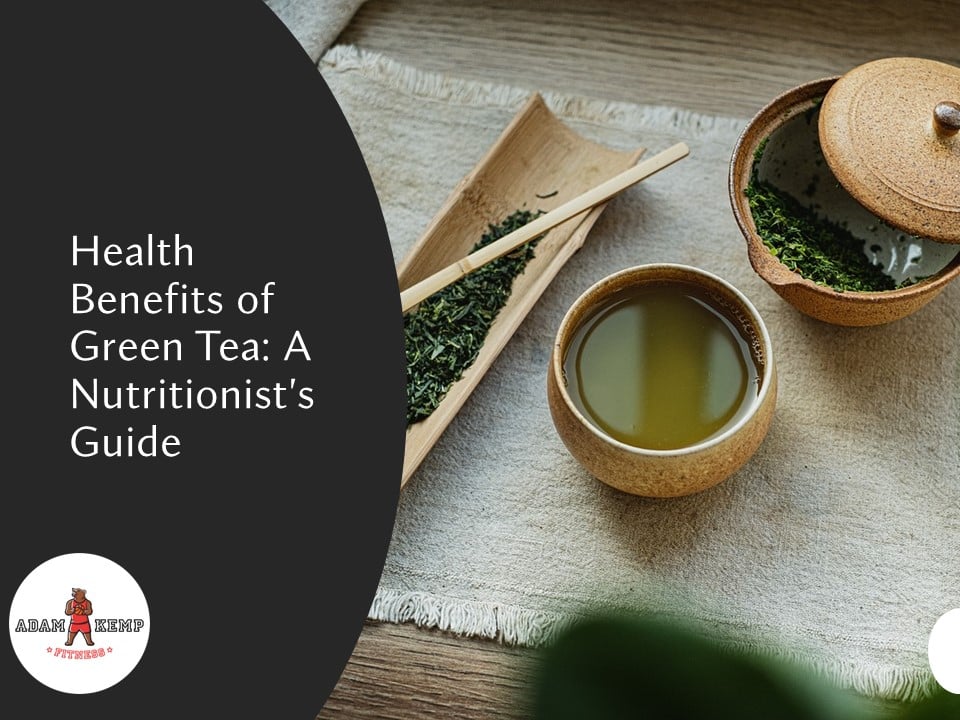
Green tea has earned its reputation as one of the most powerful health-supportive beverages in the world.
Its impressive range of bioactive compounds, including EGCG and L-theanine, supports everything from metabolism and brain health to immune function and skin clarity.
Whether you’re looking to improve daily energy levels or support long-term wellness, the benefits of green tea reach far beyond the teacup.
Here’s a closer look at the top health benefits of green tea backed by both tradition and science.
1.) Improves Skin Health
Green tea is rich in antioxidants that reduce oxidative stress on the skin, slowing aging and reducing wrinkles (Chacko et al., 2010; Hsu, 2005).
Topical and internal use can diminish puffiness, treat acne, and protect from UV-induced skin damage (Chen et al., 2011; Yoon et al., 2013).
Its anti-inflammatory properties help soothe irritated skin, while catechins may reduce redness and blemishes caused by environmental stressors.
Regular consumption may also support skin hydration and elasticity, improving overall tone and texture for a more youthful appearance.
2.) Promotes Weight Loss
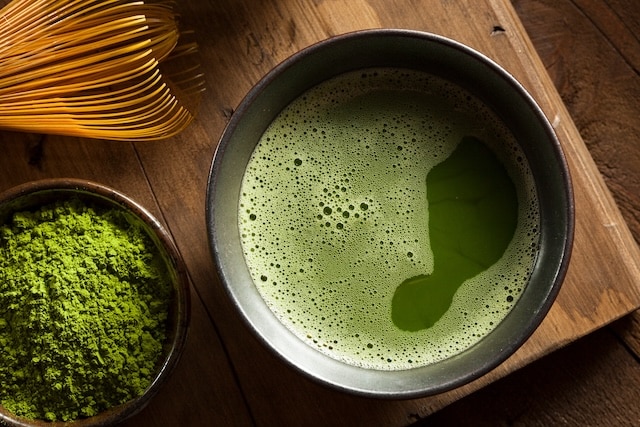
Green tea is one of the best types of tea for weight loss due to its rich catechins content.
Green tea extract (EGCG) is a catechin that helps reduce calorie absorption, promote fat oxidation, and stimulate thermogenesis, especially when consumed on an empty stomach or before workouts (Bhardwaj & Khanna, 2013; Dulloo et al., 2000).
These effects are particularly helpful when paired with a balanced diet and consistent exercise, making green tea a supportive ally in weight management.
It may also help regulate appetite and blood sugar levels, reducing cravings and stabilizing energy throughout the day.
Drinking green tea for weight loss is especially effective if you drink it on an empty stomach, which is why it is one of the best teas to drink in the morning.
Many people also use green tea extract for weight loss as a convenient and concentrated way to boost metabolism and increase fat-burning throughout the day.
3.) Boosts Workout Performance
Green tea is one of the best natural pre workout alternatives because the blend of caffeine and EGCG in green tea increases energy, fat utilization, and improves muscular endurance (Doherty & Smith, 2005; Murase et al., 2006).
Drinking a cup or two of green tea before workouts can improve strength training results and endurance activities, as it not only delays fatigue but also improves focus during training, leading to more efficient workouts.
Long-term use may even support recovery by reducing oxidative stress and inflammation in muscles post-exercise.
4.) Supports Gut Health
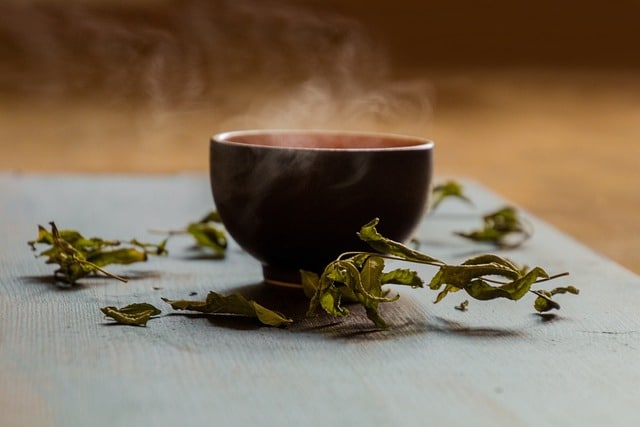
Polyphenols in green tea act as prebiotics, promoting beneficial gut bacteria while suppressing harmful strains (Janssens et al., 2016; Boccellino & D’Angelo, 2017).
Green tea can also improve the intestinal barrier, improving nutrient absorption and reducing inflammation in the digestive tract.
For these reasons, drinking green tea may even help manage symptoms of digestive disorders like IBD.
By nurturing a diverse gut microbiome, green tea plays an important role in immune function and emotional well-being.
So, the next time you enjoy a cup of green tea, you can take joy in knowing you are improving your gut health.
5.) Improves Brain Function
Green tea’s L-theanine and caffeine combination boosts focus, memory, and reaction time without overstimulation (Haskell et al., 2008; Nobre et al., 2008).
It may even offer neuroprotective benefits against age-related cognitive decline.
L-theanine helps regulate mood and attention by increasing dopamine and serotonin levels in the brain.
Over time, regular green tea intake may help preserve mental clarity and reduce the risk of degenerative neurological conditions.
6.) Natural Stress Relief
L-theanine in green tea elevates calming alpha brain waves, reducing stress and promoting mental clarity (Kimura et al., 2007).
Drinking green tea also encourages mindfulness, which helps buffer the impact of cortisol and other stress hormones, and can affect mood, digestion, and sleep.
When paired with deep breathing or other calming routines, green tea can become a simple, effective natural remedy for stress.
7.) Strengthens Immune Function
Catechins in green tea support immune defense by preventing viral and bacterial adhesion to cells (Nakayama et al., 1993; Steinmann et al., 2013).
Its antimicrobial effects help ward off infections like the flu or foodborne illness.
Green tea also promotes detoxification by supporting liver health and enhancing the elimination of pathogens and toxins, making it one of the best natural detox drinks.
Daily consumption may help reduce the frequency and duration of seasonal illnesses, especially during colder months.
8.) May Reduce Breast Cancer Risk
One of the most significant benefits of green tea for women is that green tea may help reduce the risk of breast cancer due to its epigallocatechin-3-gallate content.
Green tea’s EGCG has been shown to inhibit cancer cell growth and reduce tumor progression, particularly in hormone-sensitive cancers like breast cancer (Inoue et al., 2001).
It works by neutralizing free radicals, reducing DNA damage, and modulating estrogen activity that could otherwise contribute to cancer development.
Some studies suggest that consistent green tea intake may also improve the effectiveness of certain cancer treatments or therapies.
These effects make green tea a promising dietary support strategy for women concerned with breast health and long-term cancer prevention.
9.) Supports Testosterone & Sexual Health in Men

One of the primary benefits of green tea for men is that it may support healthy testosterone levels by reducing cortisol and oxidative stress while improving circulation and vascular function (Neves et al., 2008).
Its antioxidants can help protect Leydig cells, which are responsible for testosterone production, from free radical damage.
Additionally, improved blood flow may increase erectile function and overall sexual performance, supporting confidence and quality of life.
As part of a well-rounded diet and stress management plan, green tea can be a natural ally for men’s hormonal health.
10.) Supports Heart Health and Circulation
One of the most researched and promising benefits of green tea is its ability to support cardiovascular health.
Green tea catechins, especially EGCG, have been shown to improve blood lipid profiles by lowering LDL cholesterol and triglyceride levels while raising HDL cholesterol (Kuriyama et al., 2006).
Additionally, regular green tea consumption may improve blood vessel function by enhancing endothelial health, which supports better circulation and reduced blood pressure (Hodgson et al., 2013).
These combined effects can reduce the risk of developing atherosclerosis, heart attack, and stroke, making green tea a simple yet powerful addition to a heart-healthy lifestyle.
Recommended Daily Intake of Green Tea
- General wellness: 3–5 cups per day
- Weight loss/metabolism: 2–4 cups daily, ideally before meals
- Cognitive boost: 1–2 cups in the morning or early afternoon
Avoid drinking with meals if you’re iron-deficient, and always listen to how your body responds.
Potential Side Effects of Green Tea Consumption
While green tea is generally safe, overconsumption or supplementation may cause:
- Insomnia or jitters (due to caffeine)
- Stomach upset or nausea (especially with concentrated EGCG)
- Iron absorption interference (due to tannins)
- Rare liver toxicity (linked to green tea extract, not brewed tea)
Those taking medications (especially blood thinners, beta-blockers, or stimulants) should consult a physician before increasing green tea intake (Navarro et al., 2017; Zijp et al., 2000).
How to Make Green Tea
Brewing green tea properly is essential to unlock its full flavor and health benefits.
Using water that’s too hot or steeping for too long can result in a bitter taste and reduced nutrient quality.
Here’s a step-by-step guide to make the perfect cup:
Ingredients:
- 1 green tea bag or 1 teaspoon of loose-leaf green tea
- 1 cup (8 oz) of filtered water
- Optional: lemon, honey, or fresh mint for flavor
Instructions:
- Heat the Water: Warm your water to around 160°F to 180°F (70°C to 80°C). Avoid boiling, as water that’s too hot can destroy the delicate compounds in green tea.
- Add the Tea: Place your green tea bag or loose tea (in an infuser) into your cup or teapot.
- Steep: Let it steep for 1–3 minutes. Shorter steeping yields a milder flavor, while longer steeping results in a bolder, more astringent taste.
- Remove and Enjoy: Remove the tea bag or infuser. You can drink it plain or add a slice of lemon or a touch of honey for added flavor and benefits.
Pro Tips:
- For stronger health effects, drink your green tea on an empty stomach in the morning or before meals.
- If you’re sensitive to caffeine, opt for decaffeinated green tea or reduce your steeping time.
Best Green Tea to Buy Online
When it comes to choosing the best green tea, quality matters.
Freshness, sourcing, and how the tea is processed all impact its flavor and health benefits.
If possible, I highly recommend visiting local tea shops or specialty stores where you can explore different varieties and speak with knowledgeable staff about origin, harvest time, and taste profiles.
This not only supports small businesses but often leads to finding higher-grade, fresher green teas than mass-market brands.
However, if you’re buying online, there are still excellent options available.
Below are a few of my top picks for high-quality green tea, including loose-leaf, bagged, and matcha varieties:
Chaganju Sencha Loose Leaf Green Tea
For traditional green tea lovers, Chaganju Sencha Loose Leaf Japanese sencha green tea is an excellent choice.
Grown in the famous Uji region of Kyoto, it delivers a fresh, grassy flavor with robust catechin content.
Sencha is one of the most popular types of green tea in Japan, prized for its balance of sweetness, astringency, and umami.
This variety is JAS certified organic, ensuring high agricultural standards and clean cultivation practices.
Last update on 2025-12-17 / This article includes affiliate links/Images via Amazon Product Advertising API. I may earn commissions on purchases made through these links.
FGO Organic Green Tea
FGO Organic Green tea is an affordable and eco-conscious option that comes in a resealable pouch with 100 unbleached tea bags.
It’s non-GMO, organic, and ideal for daily drinking without compromising on quality.
The packaging is biodegradable and plastic-free, making it a great option for environmentally conscious tea drinkers.
The flavor is mild and smooth, perfect for those who prefer a lighter, less bitter green tea.
Last update on 2025-12-17 / This article includes affiliate links/Images via Amazon Product Advertising API. I may earn commissions on purchases made through these links.
Uncle Lee’s Organic Green Tea – 2-Pack (100 Bags Each) + Bonus White Tea Sample
If you’re looking for quantity and value without sacrificing quality, Uncle Lee’s Organic Green Tea is a great budget-friendly option.
It also includes a single-use pack of white tea, perfect for variety.
The green tea bags are individually wrapped for freshness and convenience.
Sourced from China, this tea offers a classic flavor profile that works well hot or iced.
Last update on 2025-12-17 / This article includes affiliate links/Images via Amazon Product Advertising API. I may earn commissions on purchases made through these links.
VAHDAM Himalayan Green Tea Leaves
VAHDAM Himalayan Green Tea is a high-elevation green tea from India that is non-GMO and comes vacuum-sealed for optimal freshness.
With its smooth, clean taste and minimal bitterness, it’s a great introductory loose-leaf tea for new drinkers.
Grown in the Himalayan foothills, the tea is handpicked and packed at the source to preserve its aromatic profile.
It also comes from a socially responsible brand committed to ethical sourcing and farmer welfare.
Last update on 2025-12-17 / This article includes affiliate links/Images via Amazon Product Advertising API. I may earn commissions on purchases made through these links.
MATCHA DNA Certified Organic Matcha Green Tea Powder or Tea Bags
Matcha DNA is a USDA-certified organic matcha that is smooth, vibrant, and available in both powder and convenient tea bags.
It’s great for those looking to boost antioxidant intake or enjoy matcha’s energizing calm focus.
The matcha powder is stone-ground and ideal for traditional tea ceremonies, smoothies, or lattes.
It’s grown without synthetic fertilizers or pesticides, making it a cleaner, safer choice.
Last update on 2025-12-17 / This article includes affiliate links/Images via Amazon Product Advertising API. I may earn commissions on purchases made through these links.
What are the Best Alternatives to Green Tea?

If you’re looking to change up your daily beverage routine or explore options with similar health benefits, there are several strong alternatives to green tea.
Whether you want more caffeine, a different antioxidant profile, or simply a new flavor experience, these drinks provide a range of benefits for energy, metabolism, and overall wellness.
White Tea
White tea is the least processed form of true tea and comes from the same Camellia sinensis plant as green tea.
It offers a mild, naturally sweet flavor and contains high levels of catechins, making it an excellent option for those seeking antioxidant support with a lighter caffeine kick.
Oolong Tea
Oolong tea is partially oxidized and offers a flavor that balances between green and black tea, smooth, floral, and slightly toasty.
It contains moderate caffeine and has been linked to increased fat metabolism, blood sugar regulation, and heart health.
Black Tea
Black tea is fully oxidized, giving it a bold, rich flavor and a higher caffeine content than green tea.
Black tea is one of the best green tea alternatives as it contains unique polyphenols like theaflavins that help reduce inflammation and support cardiovascular health.
It’s a good fit for those who prefer a stronger brew with more pronounced energizing effects.
Yerba Mate
Popular in South America, yerba mate contains caffeine, theobromine, and a variety of antioxidants.
Yerba mate is one of the best green tea alternatives because offers a more stimulating effect than green tea and is often used to enhance focus, suppress appetite, and support metabolic function.
Yerba mate also contains saponins, which may contribute to immune and anti-inflammatory benefits.
Black Coffee
Coffee is one of the best alternatives to green tea and one of the most widely consumed beverages for boosting energy and improving focus.
Coffee vs green tea is a common debate amongst people searching for ways to optimize their health and lifestyle, but both drinks are healthy in their own ways.
It’s higher in caffeine than green tea and contains antioxidants such as chlorogenic acid, which may support fat burning, blood sugar regulation, and cardiovascular health.
When consumed without added sugars or creamers, black coffee is a powerful tool for mental and physical performance.
Final Thoughts: Is Green Tea Good for You?
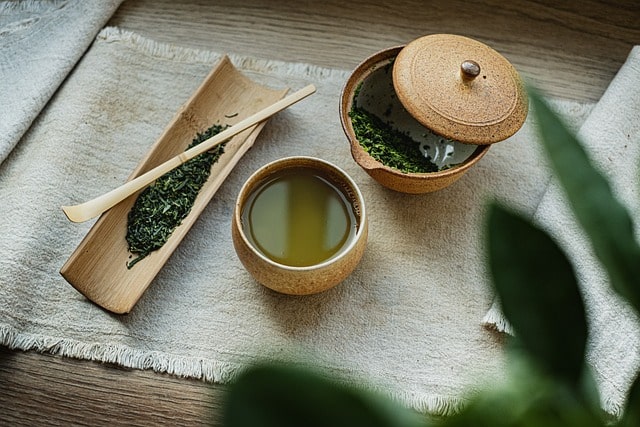
Green tea is undeniably one of the most beneficial beverages you can include in your daily routine.
Backed by centuries of use and supported by modern research, green tea delivers a wide range of health benefits, from improving brain function and metabolism to supporting heart health, skin clarity, and immune resilience.
Its unique combination of antioxidants, L-theanine, and gentle caffeine offers both mental clarity and physical vitality without overstimulation.
Whether you enjoy it as a traditional brew, a matcha latte, or a supplement, green tea can support long-term wellness when consumed consistently and mindfully.
For those seeking a natural way to improve their energy, reduce inflammation, and protect their health, green tea remains a trusted and accessible option.
Just be sure to choose high-quality sources, monitor your intake if sensitive to caffeine, and enjoy it as part of a balanced lifestyle.
Let each cup be a daily practice that nourishes both body and mind.
Frequently Asked Questions
This website does not provide medical advice. This website site does contain affiliate links, and purchases may earn a commission.
Read my Medical Disclaimer, Review Disclaimer, and Publishing Policies for more details. Use of this site indicates acceptance of these terms.



